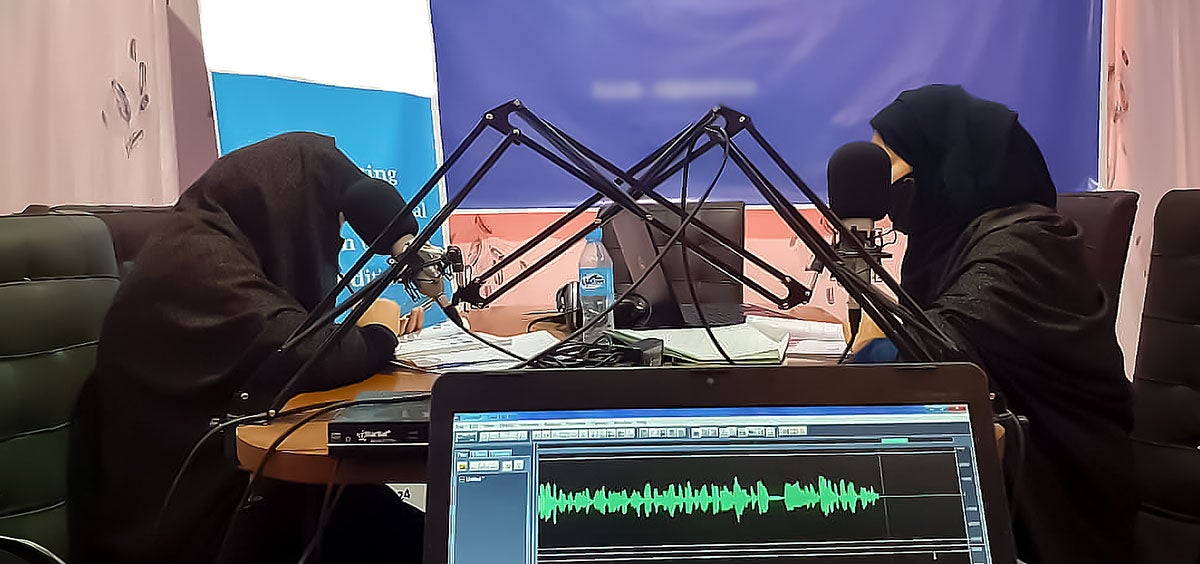Local women-run radio station helps Afghan women claim their rights
Date:

On International Women’s Day, 8 March 2021, former journalist and teacher Hawa* launched Radio Femme* in Western Afghanistan. A rarity in the country, this female-run radio station continues to operate under the Taliban’s rule. It seeks to harness the power of radio to empower, raise awareness, and bring education to women and girls across the province.
“I founded this radio station because I was so passionate about journalism, and I found that children and women need a lot more education and awareness about their rights, especially in remote areas,” says Hawa.
She says the station has since received many comments from women who have reached out to thank them for informing them about their right to claim their inheritance. “They tell me that after they gained that awareness from us, they were able to ask their family for their rights. It’s amazing to me that our radio station has helped them raise their voices and [use the information to improve their situation]!”
An estimated 60,000–70,000 Afghans tune in to Radio Femme broadcasts and access their content on social media, in Pashto and Dari, such as videos and podcasts posted on their Facebook page.
“Some Taliban members also listen to our radio station and some of them, after learning about this, have gone to their local mosque and asked leaders to inform their followers and others about women’s right to inheritance in Islam,” explains Hawa. “So, we see that we are even changing the minds of some Taliban! Maybe they’ve also changed their ideas in other areas, but at least on inheritance rights, we know that our radio programmes have influenced their mindset, and this is a huge achievement for us.”
Radio Femme also has eight teachers covering different subjects, such as math and science for grades 7 to 12. Although Hawa is the manager, she also occasionally fills in to teach certain subjects when needed, given her bachelor’s degree in Pashto literature.
“One of the biggest changes I faced [after the Taliban takeover] was that before, we were able to go to the radio station physically to record programmes,” says Hawa. “But now, we record every session from home, and we can only go to the radio station twice a week. At the beginning, the Taliban [in our province] said that no one should even hear the voice of a woman over the radio.”
Having worked as a reporter in broadcasting for 12 years before the Taliban takeover, Hawa was shocked at this position. As the Taliban wouldn’t speak to her directly, her husband went to convince them.
“At first, we had a lot of problems,” she reminisces. “But now, they don’t have problems with our content because it is educational. They even think it’s a great idea for us to educate girls who are at home. They just don’t want to hear women’s voices in advertising and other areas.”
Her colleague Fatana*, a former activist and youth representative before the takeover, explains that the Taliban’s policies differ from province to province and strong coordination is required to build trust between the organization and the de facto authorities.
Radio Femme’s project with UN Women began in October 2023 to support their core operations, allowing Radio Femme to double its paid employees, from 8 to 16 and buy equipment, such as microphones for their station. The UN Women project also provides them with capacity-building training on key areas such as project and organizational management as well as financial management.
“After these trainings, everything is so well-managed and we’ve defined our goals,” says Fatana. “The trainings have [advanced] our way and we now know how to do things better. … We used to ask our male colleagues for help. But now, after this training, I can work independently. And I can do the work better than before.”
Hawa says the partnership has allowed her to expand her vision: “We have big dreams and one of them is to grow our work beyond our district, but I want us to grow to other provinces as well. This is the least we can do for our people.”
Radio Femme is supported by UN Women’s ‘Rebuilding the Women’s Movement in Afghanistan’ programme. The pilot programme, launched by UN Women in 2022, supports women’s organizations across the country in a critical and constrained context for civil society. It provides core funding and reduces the administrative burden for organizations to access grants, capacity-development and peer-to-peer exchange. As of April 2024, the programme has partnered with 113 organizations across 19 provinces and supported 515 women staff with salaries.
“This kind of support is vital to keeping grass-roots women’s organizations alive and preparing them for participation in humanitarian and basic needs interventions at a larger scale,” explains UN Women Special Representative in Afghanistan Alison Davidian. “It reflects our commitment to strengthening women’s organizations and the women’s movement and countering the systematic erasure of women from public life.”
* Names changed to protect the identity of the protagonists and organizations.